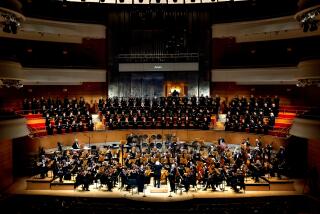MUSIC REVIEW : Neo-Classical Recital by Organist Cherry Rhodes
- Share via
A recital as superbly accomplished as organist Cherry Rhodes’ was Sunday evening is a two-edged sword when it is a fund-raiser for the restoration of the instrument on which it is played. Listeners to her assured, sparkling work would be hard put to identify the organ as one needing major repair.
Yet the current estate of the big 1928 Skinner at Immanuel Presbyterian Church is such that composer Rayner Brown had to revise portions of his 20th Sonata for Organ to avoid non-functioning notes on some of the solo stops.
Rhodes began her program with the local premiere of the Sonata. Built in four concise, relatively conventionally formed movements, it is a substantial piece of ingratiating neo-Classicism. The central movements--a powerful adagio and a wry, brittle scherzo--with their strong suggestion of Prokofiev, were particular pleasures.
The organist, a member of the USC faculty, attended to the piece with loving detail. Her registrations emphasized the fluidity of the piece, giving each movement a clear sonic character, and she flew over the technical challenges with dancing ease.
Clarence Mader, the longtime organist at Immanuel and dean of local organists when he died in 1971, composed voluminously for the instrument, in a wide range of styles. Rhodes revived three of Mader’s neo-Classical character pieces for the occasion.
Best of these was the crisp, pungent “Pantomime,” though the portentous “October Interlude” was the biggest and most serious. Whatever its parodistic intentions, “Afternoon of a Toad” sounded like a long ride on a loud carousel.
If there was a significant fault with Rhodes’ program, it was in the extended focus on light neo-Classical fare. Calvin Hampton’s Five Dances, based on ostinatos, continued that. Individually agreeable, though overly long for the slender material, the set was too much of an airy thing on this agenda.
In that context, Larry King’s gloriously gaudy, richly dramatic “Revelations of Saint John the Divine” was more than welcome. The tape part, with its hissing winds, boys voices and bird calls, created a vividly spacious effect, filling the upper reaches of the high ceilings in the sanctuary with swirling sounds.
Rhodes played it all, whether the heavy chordal assertions or the gentle pop benediction, with purposeful spirit. She kept the organ-tape relations firm and well-motivated.
More to Read
The biggest entertainment stories
Get our big stories about Hollywood, film, television, music, arts, culture and more right in your inbox as soon as they publish.
You may occasionally receive promotional content from the Los Angeles Times.










